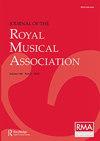工人国际主义、地方歌曲与城市空间政治
IF 0.5
2区 艺术学
0 MUSIC
引用次数: 0
摘要
在罢工和占领工厂的高峰期,标志着都灵的两年红(1919 - 1920),一系列的歌曲在工人之间流传。我将以其中两首歌曲《La guardia rossa》和《Miśeria, miśeria》为重点,聆听它们所讲述的关于城市劳动阶层的特殊故事:这些歌曲如何作为政治表达和团结的工具,以及作为过去劳动和冲突记忆的地点。在双年展之后,这两首歌都在工人和他们的家人的记忆中留存了很长时间,作为口头和书面的证据,证明了那个似乎革命可能发生的时刻。然而,关键的一点是,尽管两者都是当地政治环境和社区特定的工人阶级情绪的表达,但它们也表明了一个更广泛的国际主义团结网络。我想进一步探讨的是地方主义和国际主义之间的紧张关系和趋同——也许是一种“地方国际主义”促使我们关注小规模社区更广泛的政治潜力,以及在一个经常以国家紧缩和跨国交流为框架的时期内政治意识形态的处境本文章由计算机程序翻译,如有差异,请以英文原文为准。
Worker Internationalism, Local Song and the Politics of Urban Space
At the height of the strikes and factory occupations that marked Turin’s biennio rosso (‘two red years’, 1919–20) a series of songs circulated among the workers. I will focus on two of these songs – La guardia rossa and Miśeria, miśeria – to listen to the particular stories they tell about the experiences of the city’s labouring classes: the ways in which the songs functioned as vehicles of political expression and solidarity, and as loci of memories of past labour and strife. Both songs survived in the memories of workers and their families long after the biennio rosso, as oral and written testaments to a moment when it seemed that revolution might be possible. The crucial point, however, is that while both were expressions of a local political milieu and neighbourhood-specific, working-class sentiment, they also gestured to a broader network of internationalist solidarity. It is the tensions and convergences between localism and internationalism that I want to explore further – a ‘local internationalism’, perhaps, that prompts us to pay attention to the broader political potential of small-scale communities, as well as to the situatedness of political ideologies during a period often framed in terms of national retrenchment and transnational exchange.60
求助全文
通过发布文献求助,成功后即可免费获取论文全文。
去求助
来源期刊
CiteScore
0.50
自引率
0.00%
发文量
16
期刊介绍:
The Journal of the Royal Musical Association was established in 1986 (replacing the Association"s Proceedings) and is now one of the major international refereed journals in its field. Its editorial policy is to publish outstanding articles in fields ranging from historical and critical musicology to theory and analysis, ethnomusicology, and popular music studies. The journal works to disseminate knowledge across the discipline and communicate specialist perspectives to a broad readership, while maintaining the highest scholarly standards.

 求助内容:
求助内容: 应助结果提醒方式:
应助结果提醒方式:


